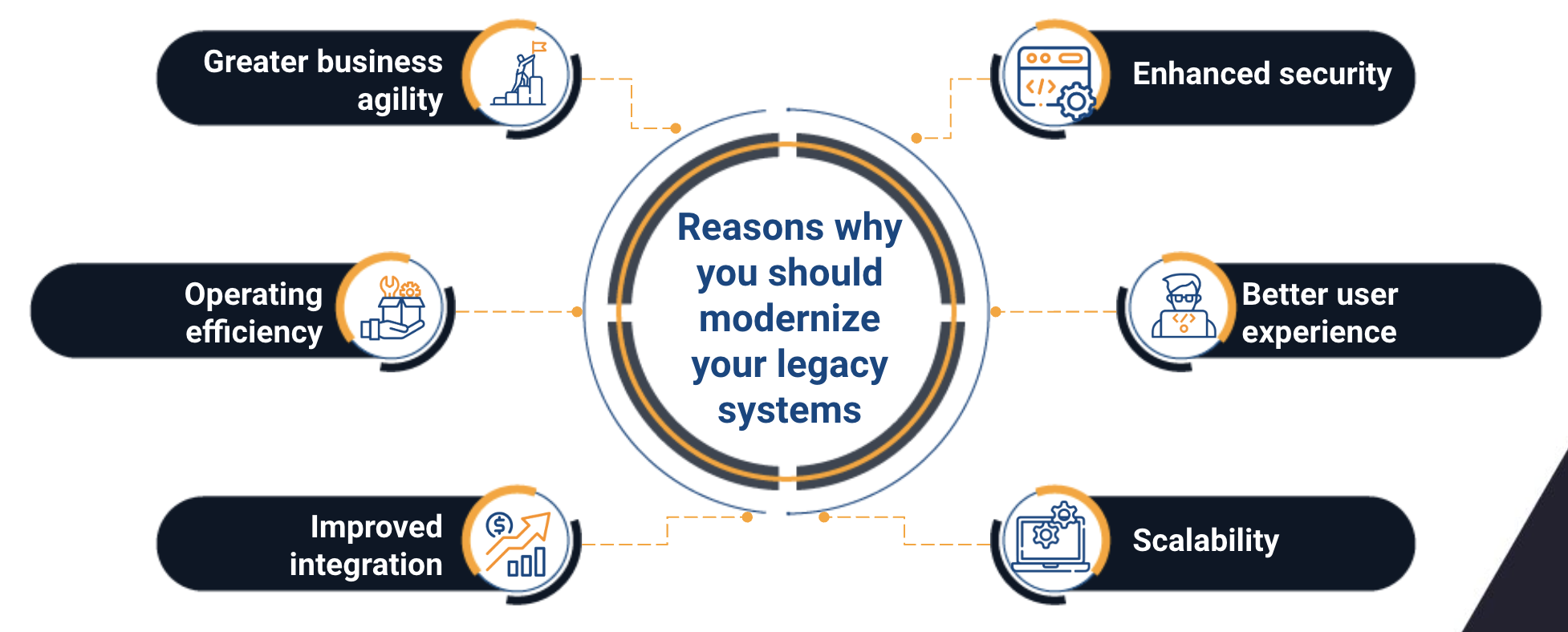CEO's Guide to the importance of modernizing legacy systems in your business
January 23, 2024
Table of contents
Quick Access

Business leaders face a strategic challenge when dealing with legacy systems in their organizations. They recognize the critical importance of these systems in the daily functioning and operational stability of the company. At the same time, they are aware of the need to evolve towards more modern and flexible technologies to maintain competitiveness and adaptability in a dynamic business environment.
To address this dichotomy, leaders often adopt incremental approaches, implementing modernization strategies that minimize disruption to existing operations with the support of internal and external outsourcing software development teams. This may involve incrementally updating key components, introducing more up-to-date technology layers, or migrating to more agile architectures.
Let's start by explaining the functionality of legacy systems
Legacy systems in companies refer to those sets of software, hardware and processes that have been in use for a significant period and that have been developed on technologies or architectures already displaced by more modern solutions. These systems have often evolved over time to adapt to changing business needs, but are often difficult to update or replace due to the complexity of their structure and their deep integration into business processes.
These legacy systems represent both a strength and a challenge for companies. On the one hand, they have accumulated deep knowledge about internal processes and are crucial to daily operations. On the other hand, its technological obsolescence may limit the company's ability to adopt new emerging technologies and adapt quickly to changes in the market.
"For many organizations, legacy systems are seen as holding back the initiatives and business processes that depend on them," said Stefan Van Der Zijden, vice president analyst at Gartner. "When an inflection point is reached, application leaders should look to application modernization to help remove bottlenecks", he added in the article.
Managing and maintaining these systems becomes a delicate balance between the need for operational stability and the urgency of technological innovation, which is why companies end up seeking help from software development teams to support them in this management, as well as the transition towards more modern and flexible solutions to maintain long-term competitiveness.

Characteristics of legacy systems
- The technology is obsolete, which may be incompatible with modern standards and best practices, they noted in an IBM article.
- Performance may be inefficient according to current business needs.
- They have outdated security measures and lack of updates.
- High maintenance costs.
- The scalability of legacy systems is limited.
- Legacy applications may not adapt easily to your newer systems.
Reasons why your company should move towards modernizing its legacy systems
Modernizing legacy systems is essential for a company's growth and sustainability in today's business environment. Here are some key reasons why a company should consider moving toward modernizing its legacy systems:
-
Greater business agility
Modern systems allow for greater flexibility and agility in adapting to changes in market requirements, new technological trends and customer demands.
-
Operating efficiency
Newer technology solutions are often more efficient in terms of performance and resource consumption, which can lead to significant improvement in operational efficiency and long-term cost reduction.
-
Improved integration
Modern systems are more likely to integrate easily with other technologies and applications, facilitating collaboration and data sharing both internally and externally.

-
Enhanced security
Newer technologies often have more advanced security measures, helping to protect business data and mitigate cybersecurity risks associated with older legacy systems.
-
Improved user experience
Modernization enables the implementation of more intuitive user interfaces and more engaging experiences, improving customer satisfaction and efficiency in the internal use of business tools.
-
Scalability
Modern systems are more scalable, meaning they can easily adapt to business growth without sacrificing performance.
-
Normative compliance
Regulations and standards change over time. Modernization helps ensure that systems are aligned with current regulations, reducing the risk of not meeting legal requirements.
-
Continuous innovation
Modernization allows companies to quickly adopt new technologies and take advantage of innovations that drive competitiveness in the industry.

Moving towards modernizing legacy systems is not only a strategic necessity to remain relevant and competitive, but also provides tangible benefits in terms of efficiency, security, and the ability to adapt to an ever-evolving business environment.
Do you need a software development team to modernize your legacy system? At Rootstack we have +13 years of experience supporting companies in their digital transformation. Contact us.
We recommend you this video
Related Blogs
-10.43.50-a.m.png)
Frequently asked questions about hiring web development companies
-3.51.27-p.m.png)
What are the steps to hire an IT outsourcing company?
-10.18.48-a.m.png)
5 pain points that nearshore software development solves for your business
-1.17.37-p.m.png)
We look at how AWS tools help you optimize costs
-10.38.35-a.m.png)
The basics of cloud computing
-9.19.54-a.m.png)
